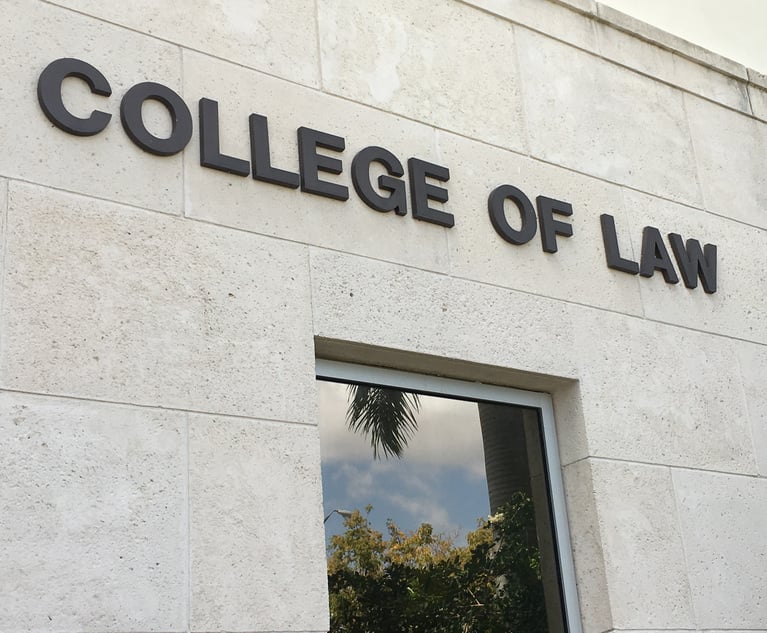New High-Tech Way to Choose a Law School Debuts
The program from AccessLex Institute uses an in-depth questionnaire to help aspiring law students identify the law schools that align most closely with their career goals, their financial priorities, and their preferred locale and lifestyle.
October 02, 2019 at 05:59 AM
4 minute read
Big Law or public interest? Six-figures in loan debt or very little borrowing? Sunny weather or close to home?
Those are a few of the preferences would-be law students weigh while completing XPloreJD, a new online program from AccessLex Institute that aims to help users determine what matters most to them, then identify the best law schools based on those priorities. The free tool, which came online Wednesday, is designed to educate users about law school and legal careers and provide insight that goes beyond a school's U.S. News & World Report ranking.
"This is not meant to compete with other resources or tools, but really to supplement and, hopefully, be a first step for someone who is exploring law school but doesn't know a lot of about it," said Tiffane Cochran, managing director of research at AccessLex. "Maybe they know about U.S. News & World Report and know what the T14 schools are, but aren't really sure which schools are best suited for them."
XPloreJD is based on an in-depth questionnaire that asks users to input their preferences in six different areas: location, cost, enrollment, diversity, curriculum, employment and bar pass outcomes. Users identify then which of those factors are most important in selecting a law school. The initial data input process takes about 15 minutes, though its designers urge people to spend more time contemplating and logging their preferences.
The program runs those preferences through a proprietary algorithm and provides a list of schools that most closely meet those criteria. Along with the list, the tool provides more data on those schools, links to their websites, and allows users to compare schools side-by-side. It also enables users to adjust their preferences and narrow their focus. They can save their results for future use. (AccessLex Institute is a nonprofit organization aimed at increasing access to legal education through research and programming.)
"There are plenty of services that rank law schools or project likelihood of admission to a particular law school, and while such information may have value, we believe students should have a free and easy way to consider and prioritize all the factors that will impact their law school decision in a holistic and well-informed way," said AccessLex president Chris Chapman.
XPloreJD's algorithm uses law school data pulled from the American Bar Association, U.S. News & World Report, the U.S. Department of Education, and even the National Oceanic and Atmospheric Administration. (It uses NOAA data to narrow down schools based on the type of climate users prefer.)
The goal is not to simply spit out a list of schools users should consider, Cochran said. Rather, its designers hope to help users think through what is important to them, and better understand the application process as well as how law school works.
"They should think about where their academic credentials will place them in a school's incoming class, but they should also consider other aspects of fit, such as location, size and diversity, as well as graduation outcomes, such as bar passage, clerkship opportunities, and job placement rates," she said. "Navigating all of this information can be difficult for some pre-law students. XploreJD is designed to change that."
For example, the questionnaire doesn't just ask users to input what type of job they hope to have upon graduation, but it also provides information on what a public interest job is. It weighs schools based on where users aspire to work, based on ABA data showing the states in which a school's alumni tend to work.
AccessLex has been bolstering its programming for aspiring law students in recent months. XploreJD comes on the heels of the release of MAX Pre-Law—an online program that helps potential law students think through every aspect of that choice to determine whether or not law school is right for them. It also helps with choosing a law school, applying for it, and understanding the finances of getting a law degree.
XploreJD took about two years to come to fruition, and AccessLex purposefully released it at the start of the admissions cycle in hopes that it will help people who want to begin their legal studies next fall.
"It's the only tool for pre-law students that gives you a learning experience—that sort of provides you with a virtual pre-law adviser in front of your face," Cochran said. "It gives you some information that I don't think is easily accessible from other sources."
This content has been archived. It is available through our partners, LexisNexis® and Bloomberg Law.
To view this content, please continue to their sites.
Not a Lexis Subscriber?
Subscribe Now
Not a Bloomberg Law Subscriber?
Subscribe Now
NOT FOR REPRINT
© 2025 ALM Global, LLC, All Rights Reserved. Request academic re-use from www.copyright.com. All other uses, submit a request to [email protected]. For more information visit Asset & Logo Licensing.
You Might Like
View All
Florida Law Schools Are Seeing a Bump in Applications for 2025, After Recent Declines at Flagship Schools
3 minute read

Law School Applications are Up Across the Country. Law Deans Aren't Sure Why
6 minute read
Librarian's Termination Violated First Amendment Protections, Lawsuit Claims
3 minute readTrending Stories
- 1Parties’ Reservation of Rights Defeats Attempt to Enforce Settlement in Principle
- 2ACC CLO Survey Waves Warning Flags for Boards
- 3States Accuse Trump of Thwarting Court's Funding Restoration Order
- 4Microsoft Becomes Latest Tech Company to Face Claims of Stealing Marketing Commissions From Influencers
- 5Coral Gables Attorney Busted for Stalking Lawyer
Who Got The Work
J. Brugh Lower of Gibbons has entered an appearance for industrial equipment supplier Devco Corporation in a pending trademark infringement lawsuit. The suit, accusing the defendant of selling knock-off Graco products, was filed Dec. 18 in New Jersey District Court by Rivkin Radler on behalf of Graco Inc. and Graco Minnesota. The case, assigned to U.S. District Judge Zahid N. Quraishi, is 3:24-cv-11294, Graco Inc. et al v. Devco Corporation.
Who Got The Work
Rebecca Maller-Stein and Kent A. Yalowitz of Arnold & Porter Kaye Scholer have entered their appearances for Hanaco Venture Capital and its executives, Lior Prosor and David Frankel, in a pending securities lawsuit. The action, filed on Dec. 24 in New York Southern District Court by Zell, Aron & Co. on behalf of Goldeneye Advisors, accuses the defendants of negligently and fraudulently managing the plaintiff's $1 million investment. The case, assigned to U.S. District Judge Vernon S. Broderick, is 1:24-cv-09918, Goldeneye Advisors, LLC v. Hanaco Venture Capital, Ltd. et al.
Who Got The Work
Attorneys from A&O Shearman has stepped in as defense counsel for Toronto-Dominion Bank and other defendants in a pending securities class action. The suit, filed Dec. 11 in New York Southern District Court by Bleichmar Fonti & Auld, accuses the defendants of concealing the bank's 'pervasive' deficiencies in regards to its compliance with the Bank Secrecy Act and the quality of its anti-money laundering controls. The case, assigned to U.S. District Judge Arun Subramanian, is 1:24-cv-09445, Gonzalez v. The Toronto-Dominion Bank et al.
Who Got The Work
Crown Castle International, a Pennsylvania company providing shared communications infrastructure, has turned to Luke D. Wolf of Gordon Rees Scully Mansukhani to fend off a pending breach-of-contract lawsuit. The court action, filed Nov. 25 in Michigan Eastern District Court by Hooper Hathaway PC on behalf of The Town Residences LLC, accuses Crown Castle of failing to transfer approximately $30,000 in utility payments from T-Mobile in breach of a roof-top lease and assignment agreement. The case, assigned to U.S. District Judge Susan K. Declercq, is 2:24-cv-13131, The Town Residences LLC v. T-Mobile US, Inc. et al.
Who Got The Work
Wilfred P. Coronato and Daniel M. Schwartz of McCarter & English have stepped in as defense counsel to Electrolux Home Products Inc. in a pending product liability lawsuit. The court action, filed Nov. 26 in New York Eastern District Court by Poulos Lopiccolo PC and Nagel Rice LLP on behalf of David Stern, alleges that the defendant's refrigerators’ drawers and shelving repeatedly break and fall apart within months after purchase. The case, assigned to U.S. District Judge Joan M. Azrack, is 2:24-cv-08204, Stern v. Electrolux Home Products, Inc.
Featured Firms
Law Offices of Gary Martin Hays & Associates, P.C.
(470) 294-1674
Law Offices of Mark E. Salomone
(857) 444-6468
Smith & Hassler
(713) 739-1250









